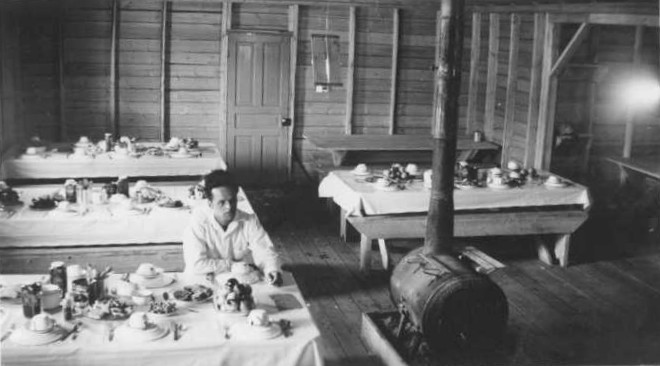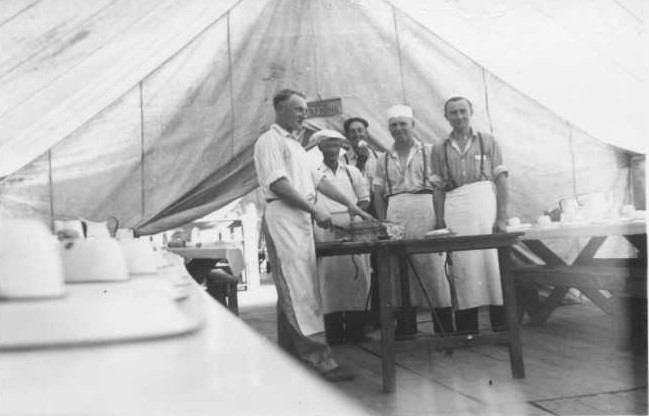Page
1 | Page 2 | Page
3 | Page 4 | Page 5 | Page
6 | Back to Life at Camp Page
Food
The
quality of the food was a common concern for COs. Much of Canada's
meat went overseas to feed soldiers and civilians in Europe. Some
COs handled it better than others. When Jake Krueger worked in the
BC Forestry Service, says that “the food was generally good and
lots of it, but monotonous.”
“With
sugar, butter and jam rationed, the cook's ingenuity was well
tested to provide nutritional meals. With pork and beef in short
supply, (sent overseas) and elk in abundance on our doorstep,
you can readily guess what your main diet consisted of.”
“The
park wardens loved nothing better than to practice their marksmanship
on the senior members of the elk herds that roamed the park. So
to disguise the monotony, our cook came up with a number of different
concoctions, we had roast, steak, stew and soup, but no matter
how he stressed his ingenuity, it always came out – elk!”
“By
springtime we were about to grow antlers, the cook sensing this,
came up with an inspiration, a meat grinder was ordered, giving
the flunkies enlarged biceps in no time, as they boned and hand-ground
literally piles of elk meat. So now it was elk burgers in a variety
of forms, tiny burgers in gravy, giant burgers as the main dish
with potatoes, burger steak, burger soup, burger meat loaf, etc.”
“We
soon came up with a camp prayer, burger for breakfast, at noon
, for supper, at snack time – Amen!”
“Another
dish that made its appearance as regular as the burger, was the
dish of turnips, but always returned to the kitchen as full as
it came!”
“Everybody
looked forward to Sunday, not only as a day of rest, that was
the one day a week when we could expect a menu change. We anticipated
a beef or a pork roast dinner and cooked ham for supper, my what
a treat." [ASM, 237-238]

So
much depended on the cook. “Cooks cook differently,” notes Waldo
Lepp.
“At
Waskesiu my appetite began to wane. Soon I could hardly eat any
more. Then providence brought a new cook to the camp, a big Swede.
With the same food rationing, this man baked and cooked unbelievably
tasty meals.” [ASM, 298-299]
 David Jantzi agrees that some cooks were better than others.
David Jantzi agrees that some cooks were better than others.
 |
 |
 |
| Eating area in at the CO camp at Clear Lake |
Inside of dining hall |
Camp cooks in the dining tent |
Most
of the cooks were not COs, although most of the kitchen helpers
were. Occasionally, however, COs were asked to prepare the food.
Jack Fransen served as cook for a small crew in a remote area. They
were building a large tower to watch for forest fires. Fransen came
to appreciate how hard it was to be a camp cook.
“All
the food and building material was back-packed on horses, to the
close to 7000 foot [2100 m] altitude. Cooking at this high altitude,
and under primitive conditions, was a challenge both for me as
a cook, and the people who ate the food.” [ASM, 197]
Though
cooking for a whole camp full of hungry men wasn't easy, some cooks
didn't even make an effort. Peter A. Unger relates the story of
one cook whose methods were so unsanitary that the campers had to
take action.
“The
cook's performance turned out to be substandard. For example the
bread batter was not thoroughly mixed and we ended up picking
lumps of flour out of the bread. Some tricksters, by making bear
noises around the cook's tent, persuaded him that his was dangerous
territory and that it was safer to move on.” [ASM, 210-218]
Page
1 | Page 2 | Page
3 | Page 4 | Page 5 | Page
6 | Back to Life at Camp Page |


